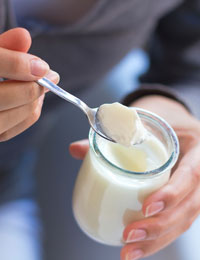
How bacteria affects everything about our health.
You might think of your gut as being simply about digestion – how your food is processed, absorbed, filtered and excreted. In fact, research is building to suggest that the health of our gut is key to much of our overall health and well-being, including our immunity and resistance to chronic disease.
We each carry around about two kilograms of bacteria inside our bodies. These bacteria actually outnumber the cells in our bodies by 10 to one – isn’t that amazing? There are trillions of them inside each of us, and most reside inside our guts. We each have a unique population of bacteria, a bit like our individual genes. The makeup of our gut bacteria is known as our ‘microbiome’, which some scientists call our ‘second genome’.
Unlike our genes, though, which we can’t change, we can do a bit to improve and maintain the health of our gut bacteria population, and potentially influence our overall health. Food is an obvious place to start. Scientists researching the microbiome think that a diverse population of bacteria is probably better for us – the more and different bacteria we harbour, the better are our chances of enjoying good health and resisting disease. A diverse diet is key to this – a diet high in plant food and whole grains is a good place to start. A high-fibre diet not only keeps things functioning well, but also feeds the ‘good’ bacteria in our guts.
The role of probiotics – useful live bacteria that can help boost the population of ‘good’ bacteria in the gut – is something that’s being increasingly researched. There’s mounting evidence that probiotics improve resistance to disease and infection by enhancing immune response in the intestine. There’s evidence that certain strains of probiotic can alleviate constipation, diarrhoea, IBS and chronic bowel disease. And some studies have shown potential for certain probiotic strains to be beneficial in reducing the risk of recurrence of certain cancers, including colon and bladder cancers.
You will have seen probiotics promoted in dairy products such as yoghurt, in fermented milk drinks and in supplements. If you’re looking for probiotics to get health benefits, pay attention to the particular strain of bacteria, and if you can, check if there’s relevant research into that strain. There’s not much point taking a probiotic for IBS, for example, if the strain you’re taking hasn’t been tested to have an effect on IBS.
It’s also important there are enough live bacteria in the product to make it intact to the gut where they can actually do some good. It’s all very well having ‘probiotic’ on a yoghurt label, but probiotic bacteria are susceptible to light, heat and age, not to mention the hostile environment of our stomachs and the acid inside. So ideally we need to start out with billions of live bacteria – it’s really great if you can see this on the label. When it comes to these particular germs, more is definitely better!
www.healthyfood.com











